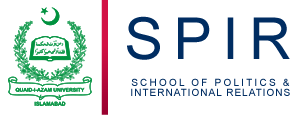The School of Politics and International Relations hosted an international webinar titled “The Russian-Ukraine War: Political, Strategic and Humanitarian Imperatives” in collaboration with the Embassy of Ukraine in Pakistan on May 18, 2022.
Dr. Farhan Siddiqi, Director of the School of Politics and International Relations, welcomed the esteemed guests and speakers from Ukraine and Pakistan, and thanked them for their participation. Referring to the present-day conflict ravaging Ukraine, he reiterated the normative and humanitarian discourses informing the conduct of war in contemporary international politics and expressed admiration of the resilience shown by the people of Ukraine in the war against Russia. Dr. Siddiqi underscored the need for a negotiated solution to the conflict.
Mr. Vitalii Zayanchkovskyi, Deputy Head of the Ukrainian mission to Pakistan, shed light on the Russian aim to deprive the Ukrainian nation of its distinct identity and establish operational control over the territories of Ukraine. However, in spite of the horrific developments in Ukraine, Mr. Zayanchkovskyi emphasized the vigorous resistance and efforts of the people of Ukraine. The war in Ukraine, he urged, no longer remains a regional concern; it has become an issue that has the potential to drastically reshape the entire world order and influence the future of international politics. In addition, his talk presented the challenges the Russian-Ukraine conflict would pose with regard to educational and humanitarian spheres.
Mr. Mykola Bielieskov, Research Fellow at the National Institute of Strategic Studies under the President of Ukraine, addressed the military dimensions of the war. His talk, titled “Some Prior Military Conclusions after 2 Months of All-Out Ukrainian-Russian War”, provided a meticulous caricature of the conflict. Considering the misjudgments made by Moscow, Mr. Bielieskov believed that the Russian offensive failed spectacularly and could not achieve the limited goals it had in mind. The strategic encirclement of Ukraine was unable to mount any significant pressure on the morale of its people. The quality of Ukrainian resistance, he argued, could be a key factor in deciding Russia’s shift from offensive to defensive mode in the next few weeks – which seems all the more imminent now.
Regarding the resulting global, geopolitical and economic implications, Dr. Andrii Zablovskyi, Head of Secretariat of the Council of Entrepreneurs, was of the opinion that the conflict in Ukraine has disrupted the flow of supply chains, and has drastically impaired the global GDP. Global poverty rate, he warned, is expected to rise, along with the aggravation of food instability. He urged the international community to realize that the conflict in Ukraine would prove to be catastrophic, not just for Ukraine or Europe, but the rest of the world.
Prof. Dr. Zafar Nawaz Jaspal, Professor at the School of Politics and International Relations, discussed in meticulous detail the nuclear and strategic dynamics of the Russian-Ukrainian conflict. Prof. Dr. Jaspal maintained that Moscow had clearly miscalculated the reach of their offensive against Ukraine. However, it is possible to assume, he said, that Russia was aware of the asymmetrical nature of this conflict, but deliberately disregarded the capabilities of the Ukrainian people, similar to what it had done against Afghanistan. The war in Ukraine has made nuclear weapons relevant once again in the contemporary security discourses. On the other hand, Prof. Dr. Jaspal believed that the war has only served to bring strategic defeats for Moscow; not only have they overestimated the potential of the people fighting for Ukraine, the probable membership of Sweden and Finland into NATO means that the latter is unexpectedly closer to Russian borders and the Baltic Sea now.
Thanking the School of Politics and International Relations, along with the participants, for hosting this event in solidarity with the people of Ukraine, Dr. Olena Bordilovska argued that there is a lack of awareness with regard to the atrocities being committed by the Russians in Ukraine. Dr. Bordilovska reiterated that the will, desire and resolve of the Ukrainian people to remain free was taken for granted by the Russians. Moreover, she argued, that while the people and leadership of Ukraine are highly resolved actors determined to safeguard their territorial integrity, the Russian leadership and army are lacking in motivation.
The webinar concluded with an interactive and highly engaging Q&A session.

